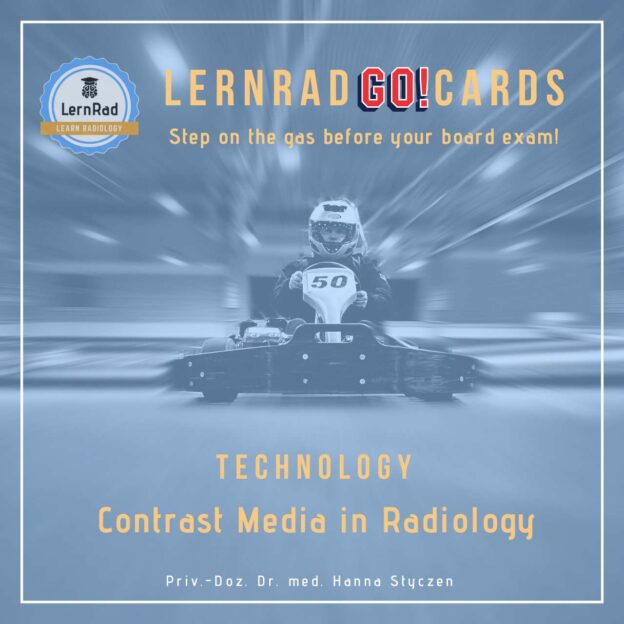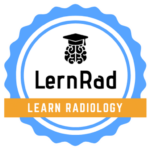In this Go!Cards set, you will find a total of 43 questions and answers on the topic of Contrast Media in Radiology to prepare for the Radiology Board Examination. You can quickly review and test the most important facts before the exam to see where your knowledge stands.
Our Go!Cards were developed according to the current European Training Curriculum for Radiology of the European Society of Radiology (ESR).
This set includes 43 questions and answers with the following subchapters:
- Basics
- X-Ray Contrast Agents
- MRI Contrast Agents
Tip: You should view the flashcards in full-screen mode, then they appear a bit larger. 🙂 We recommend using Chrome or Edge as a browser, as other browsers may display minor errors with the Go!Cards.
For the duration of your subscription (which will be automatically renewed each month if not canceled), you have full access to the Go!Cards. You can cancel your subscription at any time. Sharing your access data with third parties is, of course, not permitted (see also our general terms and conditions).
The specific learning objectives corresponding to the ESR’s European Radiology Training Curriculum for Radiology are:
B-I-15 Principles of Imaging Technology & Molecular Imaging
Knowledge Contrast Media/Agents
- To understand the molecular structure, pharmacology, classification, dose and side effects of all radiographic, MRI and ultrasound contrast media
- To explain the principle of ionic and non-ionic contrast agents
- To describe the physiological principles, physical properties, toxic effects, anaphylactoid reaction and biological effects of iodinated contrast media
- To describe the physiological principles, physical properties, toxic effects, anaphylactoid reaction and biological effects of MRI contrast agents
- To outline the best contrast material and its optimal use according to the imaging technique and the clinical problem
- To describe the various timing phases of contrast media application and their respective values according to the clinical problem
- To describe the fundamentals of intravascular bolus kinetics and constant rate input
- To describe the physiology of renal excretion of contrast medium
- To describe enhancement curves within renal compartments after injection of contrast agents
- To list concentrations and doses of contrast agents used intravenously
- To define the nephrotoxicity of contrast media
- To list risk factors of contrast media nephrotoxicity
- To identify patients at risk of contrast media nephrotoxicity
- To list methods to reduce the risk of contrast nephrotoxicity
- To describe precautions in diabetics taking metformin and requiring intravascular administration of contrast media
- To list measures to reduce the risk of contrast media nephrotoxicity
- To have an in-depth understanding of nephrogenic systemic fibrosis (NSF) including the definition of NSF, the clinical features and the risk factors
- To describe the use of Gadolinium-based contrast agents in patients at risk
Knowledge Radiography, CT, and MRI
- To describe the indications for the use of X-ray contrast media in the study of various organs / organ systems
- To describe the indications for fluoroscopy including the principles of contrast application and to list optimized protocols
- To describe the indications for the use of CT contrast media in the study of various organs / organ systems
- To describe the indications/contra-indications for the use of MR contrast agents in the study of various organs / organ systems




